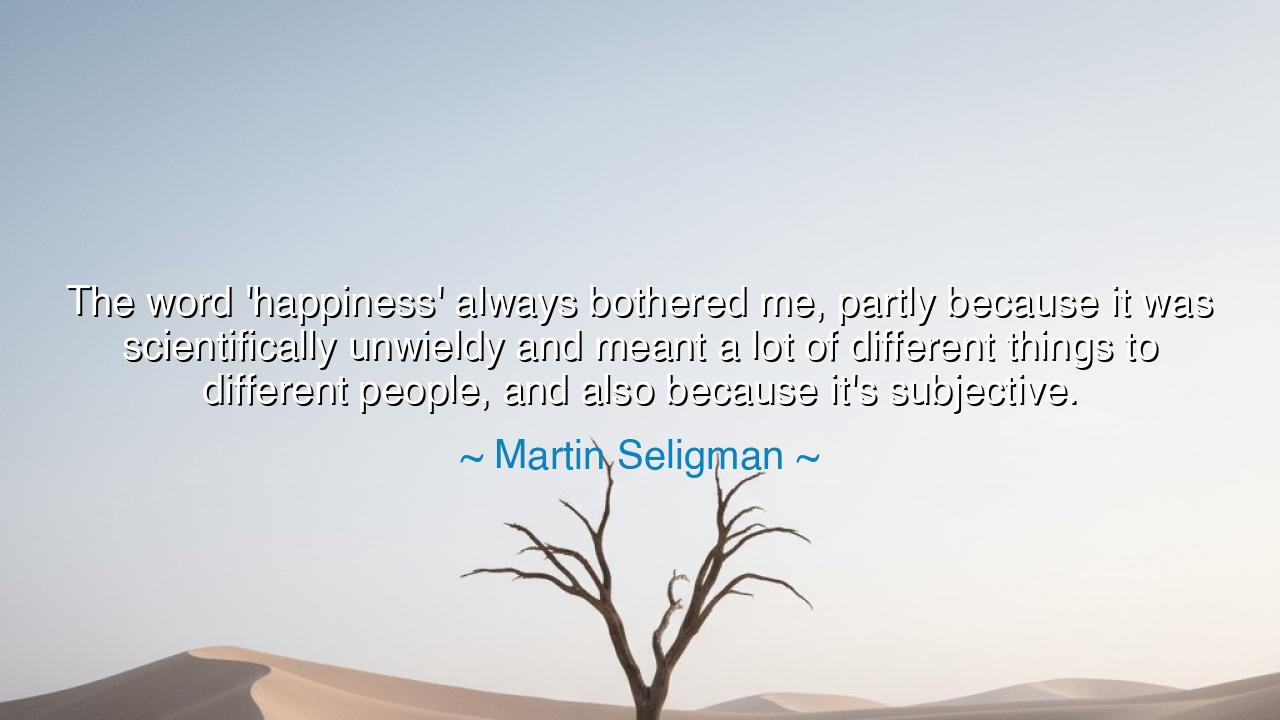
The word 'happiness' always bothered me, partly because it was
The word 'happiness' always bothered me, partly because it was scientifically unwieldy and meant a lot of different things to different people, and also because it's subjective.






"The word 'happiness' always bothered me, partly because it was scientifically unwieldy and meant a lot of different things to different people, and also because it's subjective." — Martin Seligman
In this thoughtful reflection, Martin Seligman, the father of modern positive psychology, reveals a truth that both humbles and enlightens the human spirit: that the pursuit of happiness is as vast and complex as the human heart itself. His discomfort with the word does not arise from disdain, but from reverence—for he recognizes that this simple word, which people toss about like a trinket, in fact contains a thousand meanings, each shaped by the soul that seeks it. To one, happiness is pleasure; to another, peace; to a third, purpose. And so Seligman, as a philosopher of the mind, finds the term unwieldy, for it refuses to be measured, defined, or captured. It is a shadow that changes shape depending on the light.
The origin of this quote lies in Seligman’s quest to redefine how we understand human flourishing. As a psychologist, he grew dissatisfied with a field that focused only on illness—on what breaks the human spirit—while neglecting the study of what allows it to thrive. Yet even as he turned his gaze toward well-being, he found that the word happiness was too shallow, too vague. It failed to encompass the fullness of human life: our joys, yes, but also our struggles, our growth, our meaning. Thus he began to speak instead of PERMA—his model of well-being built upon Positive emotion, Engagement, Relationships, Meaning, and Accomplishment. Through this, he taught that what we seek is not fleeting happiness, but enduring fulfillment, rooted in purpose and connection.
To call happiness subjective is to acknowledge the diversity of the human soul. The shepherd and the scholar, the artist and the warrior—each finds joy in a different rhythm. What exalts one heart may weary another. The Greek philosopher Aristotle knew this when he spoke of eudaimonia, the deep and lasting well-being that comes not from pleasure, but from living in accordance with virtue. Likewise, Seligman reminds us that there is no single path to joy; each person must carve their own. The scientist seeks truth, the poet beauty, the parent love—and in each pursuit, happiness reveals itself in a different form.
But Seligman’s wisdom runs deeper still. In his unease with the word happiness, we find a warning against the modern world’s obsession with it. Too often, people chase happiness as though it were a prize to be seized—a destination at the end of labor, rather than the fruit of a life well-lived. In seeking constant pleasure, they flee from discomfort, forgetting that struggle, too, is sacred. The ancient Stoics understood this truth. Marcus Aurelius, emperor and philosopher, taught that contentment comes not from escaping pain, but from mastering one’s response to it. True happiness, then, is not the absence of sorrow, but the harmony that arises when the soul accepts both joy and suffering as its teachers.
Consider, too, the life of Helen Keller, who was denied the senses through which most perceive the world, yet found a joy that transcended her limitations. To her, happiness was not sensation but connection—the touch of a friend’s hand, the pursuit of understanding, the ability to contribute to humanity. Her happiness could not be measured by the fleeting emotions of a day, but by the meaning of her life. In her story, Seligman’s insight becomes clear: the measure of happiness is not universal; it is deeply personal, shaped by our capacity to find light in our own darkness.
And so, Seligman asks us to look beyond the word happiness and toward something greater—flourishing. For happiness is but one note in the grand symphony of the human spirit. The wise soul does not seek to feel good all the time; it seeks to live well. It cultivates gratitude, courage, and purpose; it nurtures relationships and serves others. It does not cling to joy, for it knows joy is fleeting; it builds character, for it knows character endures. Thus, the pursuit of happiness becomes not a chase, but a practice—a daily act of tending the garden of the self.
So, my child of the future, take this teaching to heart: do not chase happiness as though it were a butterfly. Stand still, and let it come to rest upon your shoulder as you tend to the work of living. Seek meaning, not mere pleasure. Build relationships that outlast the hour, and labor in ways that lift others as well as yourself. For as Martin Seligman teaches, happiness cannot be defined because it must be lived—crafted from your choices, refined by your struggles, and illuminated by your purpose. And when you understand this, you will no longer ask, “Am I happy?”—but rather, “Am I growing, loving, and living fully?” For in that question lies the truest form of joy.






AAdministratorAdministrator
Welcome, honored guests. Please leave a comment, we will respond soon